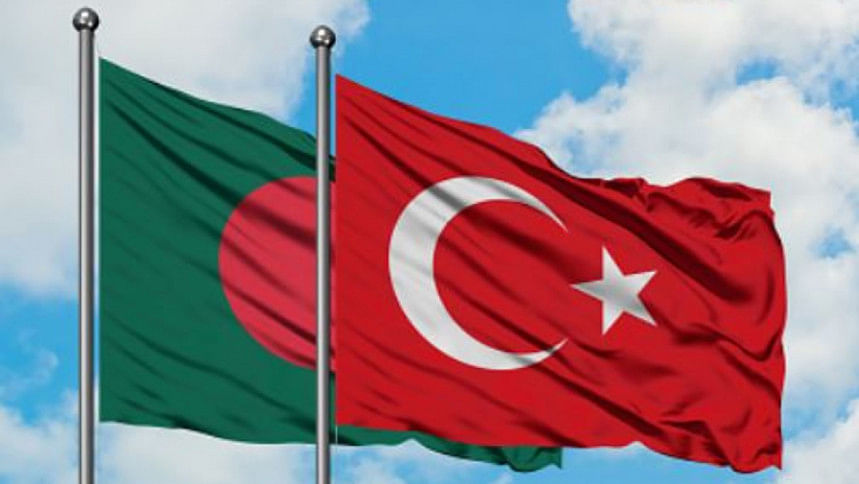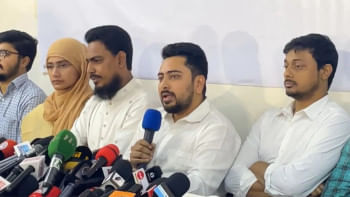Ties with Turkey finding new turfs

"In the last 10 years, Turkey has advanced a lot, especially in military technology, while Bangladesh drew global attention for its economic growth. So we see the areas of convergence are growing and so are the relations."
Coming out of past diplomatic rows, Bangladesh and Turkey are deepening relations as the latter seeks to regain its position in the Muslim world, while Dhaka looks for strong allies on the global stage to resolve the Rohingya crisis and boost trade, analysts have said.
Turkey, a NATO member with a strong military power, is an influential voice at the UN, OIC and other global forums and has been supportive of Dhaka's stance on the Rohingya issue, a much sought-after help for Bangladesh.
Bangladesh also wants increased trade with Turkey, which Ankara wants to push to $2 billion from the current two-way annual trade worth $1 billion.
Recent progress is already strengthening defence cooperation that signifies the depth of the relations, foreign policy analysts observed.
"In the last 10 years, Turkey has advanced a lot, especially in military technology, while Bangladesh drew global attention for its economic growth. So we see the areas of convergence are growing and so are the relations," said M Humayun Kabir, president of Bangladesh Enterprise Institute (BEI).
REBUILDING RELATIONS
Turkey, which sided with West Pakistan during Bangladesh's Liberation War in 1971, recognised Bangladesh in 1974 and opened its embassy in Dhaka another two years later.
The relations had grown since then, but it took a nosedive in 2012 when Ankara started condemning the International War Crimes Tribunal's prosecution of Jamaat-e-Islami leaders.
Following the execution of Jamaat leader Motiur Rahman Nizami in May 2016, Turkey withdrew its ambassador to Bangladesh, bringing the bilateral relations under severe strain.
The strained relations began healing when Prime Minister Sheikh Hasina wrote to Turkish President Erdogan, condemning the coup attempt to overthrow him in July 2016. Consequently, Ankara sent a new ambassador to Dhaka later that year.
Turkish First Lady Emine Erdogan visited Rohingya camps in Cox's Bazar in September 2017 following the influx of about 7.5 lakh refugees from Myanmar. The country actively supported the Rohingya cause at the UN, OIC and other global forums. It is also providing humanitarian assistance for the refugees, Bangladesh foreign ministry officials said.
Late last year, Bangladesh Navy and Air Chiefs visited Ankara and in September Bangladesh Foreign Minister AK Abdul Momen visited Turkey and inaugurated Bangladesh Chancery Complex. Similarly, Turkish Foreign Minister Mevlut Cavusoglu visited Bangladesh and inaugurated Turkish Embassy building in Dhaka in December last year.
Bangladesh Army Chief Gen SM Shafiuddin Ahmed also went on an eight-day visit to Turkey from August 18-26, 2021, when he met top Turkish military officials, including defence minister and head of Turkey's Defence Industries Presidency and discussed issues of possible defence cooperation, training, and exchanges.
He also inspected the operation control room of the Turkish Unmanned Aerial System (UAS), Army Aviation Headquarters, and the Turkish Aerospace Industries.
During the visit, the army chief highlighted the strategic friendship and cultural bonds between Bangladesh and Turkey, saying his visit will "open new doors for cooperation between the military forces of the two countries."
A diplomatic source in Ankara said Turkish President Recep Tayyip Erdogan might visit Bangladesh late this year, as more business delegations are exchanging visits with high potentials of trade. A parliamentary delegation from Bangladesh is expected to visit Turkey soon.
Turkish authorities have announced setting up sculpture of Bangabandhu Sheikh Mujibur Rahman in Ankara and that of Kemal Ataturk, father of modern Turkey, in Dhaka.
In June this year, Bangladesh signed a defence purchase agreement with Turkey for importing various defence equipment from Rokestan, a Turkish military hardware company and contractor.
"Our Turkish defence industry signed a deal for export [to Bangladesh] of various types of defence equipment. Don't stop, keep going!" said Ismail Demir, president of Turkish Defence Industries in a tweet on June 29. Officials of Bangladesh Embassy in Ankara confirmed the deal.
The products will equip Bangladesh Armed Forces with NATO Standard air, land and naval warfare weapons, according to Bangladesh Defence Analyst, a news portal run by the country's defence experts.
Roketsan already delivered the Tiger missile system to Bangladesh Air Force with Teber laser guided precision strike ordnance kits to Bangladesh in June, according to reports from Defence Technology of Bangladesh.
Programmes are being initiated to equip the Bangladesh Navy with the latest anti-ship missiles from Turkey whereas the Army and Air Force may obtain air defence systems, surface-to-surface missiles and advanced munitions, it said.
Turkey's Anadolu news agency recently reported that Bangladesh became the fourth-largest arms buyer from Turkey, reportedly receiving up to $60 million worth of weapons out of Turkey's roughly $1 billion in global defence product exports in the first four months of 2021.
Meanwhile, 41 members of the Bangladesh Armed Forces participated in a training in Turkey in June this year. "Bangladesh is set to become one of the top defence equipment clients of Turkey in the next five years," the news agency said.
TURKEY'S INTEREST
Dr Yatharth Kachiar, assistant professor at the Manipal Centre for European Studies of India, said Turkey, under the ruling Justice and Development Party (AKP), started pursuing its strategic interests in the Global South in early 2000. In 2019, it undertook "Asia Anew" initiative that focuses on strengthening relations with Asian countries to build synergies in education, defence, investment, trade, technology, and culture.
She says Ankara's renewed activism in Asia results from structural changes at the global level and the ideological drive behind AKP's foreign policy.
"The increasing rift in Turkey's relations with the West and the ongoing fight for primacy within the Muslim world has estranged Turkey from its traditional ally, the West and the neighbouring Islamic countries," said Kachiar in an email interview.
President Erdogan intends to expand Turkey's defence industrial base by boosting arms sales to $25 billion by 2023, and Bangladesh could become a critical market for the Turkish defence industry in future, she said.
Alan Mikhail, professor of History at Yale University, says Turkey wants to emerge as a modern version of the Ottoman Empire.
"While every modern Turkish ruler has distanced himself from the legacy of the Ottoman Empire, and Islam, to attempt to project a more western, secular and modern face for the republic, Erdogan is the first who has actively embraced the Ottoman past and the empire's Islamic heritage," he said in an email interview.
DHAKA'S STRATEGIC GOALS
According to defence and foreign relations analysts, Bangladesh has three specific goals to deepen relations with Turkey: diplomatic strength, trade and diversifying arms sources.
Former foreign secretary Shamsher Mobin Chowdhury said Turkey was militarily and politically a global power having an independent strong voice. Also, it is the only Muslim majority country with NATO membership.
He said Bangladesh, which has been facing serious diplomatic challenges for the Rohingya crisis, needs its ally, and Turkey has proved to be one in various global forums, including the International Court of Justice.
Analysts said traditionally, Bangladesh buys major defence equipment from China, Russia, US, UK and South Korea.
"Turkey is making quality arms, which are not very expensive and can come without conditions. This is what Bangladesh needs," a diplomatic source in Ankara said. "Also, Bangladesh can get technology for manufacturing equipment here."
Security analyst Brig Gen (retd) Shahedul Anam Khan said buying anti-ship missiles and air defence systems from Turkey means the country has more options for military purchase.
Buying defence products does not mean only doing it once. That requires training and then accessories in future. "During critical moments, you cannot depend for arms supplies only on one source. If you have more options, you have more independence."
Brig Gen (retd) M Shakhawat Hossain said Bangladesh does not have any security threat as such for now. But as the economy grows and the need for securing huge maritime boundary is high, the country's armed forces need modernisation.
"Also, we are the biggest peace-keeper-sending country to the UN missions. We need capacity building and modern defence equipment for that too," he said.
The other reason why Dhaka's relation with Ankara is important is the country's economy. As the country becomes a middle-income country soon, it needs more trade and foreign investments, said M Humayun Kabir.
Turkey, an upper middle-income country in Europe, can be a large market for Bangladesh. The countries can also have joint ventures, including in textile, as they both have specialties in the sector and other areas, he said.
Asked if Erdogan's rightist policy and conflicts with Saudi Arabia will have any implications on Bangladesh, Humayun Kabir said it is unlikely.
"If Turkey wants to regain its power like that of Ottoman Empire, it is fine. We will see where our convergence is."
Bangladesh also maintains the policy that friendship with one does not affect the other, he said.
"Bangladesh's relation is with the state, not the government of Erdogan," Shamsher Mobin Chowdhury said.

 For all latest news, follow The Daily Star's Google News channel.
For all latest news, follow The Daily Star's Google News channel. 



Comments